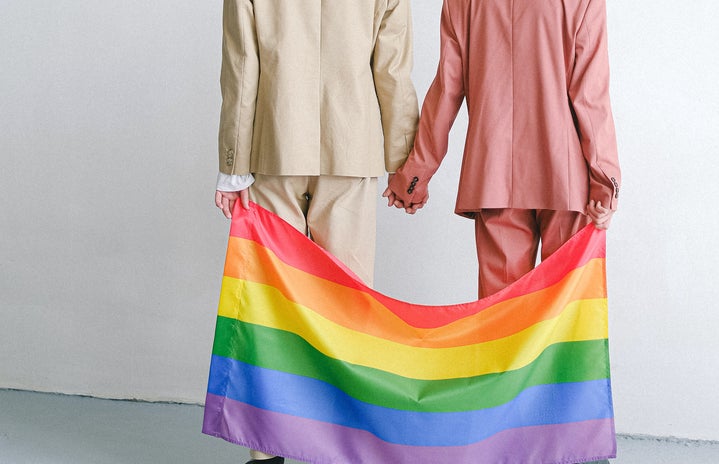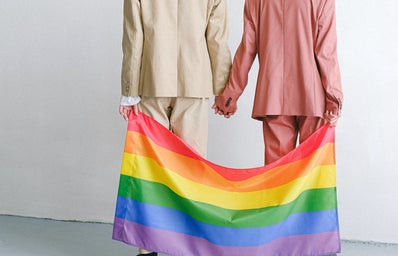Kit Connor is an 18-year-old English actor who recently got recognition for his role as Nick Nelson in the series Heartstopper on Netflix. He broke his Twitter hiatus (that started due to harassment) to say “Back for a minute i’m bi. congrats for forcing an 18 year old to out himself. i think some of you missed the point of the show. bye.” This tweet has gotten a lot of traction over the past couple of days and it brings up a lot of the problems our culture has with what it looks like to be queer and what we want from our celebrities.
Queerbaiting is a term that gets thrown around a lot on the internet, but what does it actually mean? The Rolling Stone did an interview with filmmaker, writer, and activist Leo Herrera who defines the term as “a celebrity or a public figure capitalizes on the suspicion that they may be romantically involved with another same-sex person for the sake of publicity, promotion or a capitalistic gain.” He also says media makers “play with our lack of representation and desires to get us in the theaters or get us to watch.” Basically, it is when the media or celebrities use queer identities to make money without being a part of or actually helping those identities in any productive way. It has since been taken to another level by the internet and is used against anyone who may be performing as queer without revealing their sexual or gender identities.
Being a child of the internet and media, the first experience I had with queerbaiting was through television. In my teenage bedroom, I would pore over details and homoerotic subtext given in shows like Supernatural and Sherlock. Neither show ever gave audiences the homosexual relationships that they hinted at in their years of run-time. These are just a couple of examples of modern television using queer identities to lure audiences into a show (and the 15 seasons of Supernatural definitely are a commitment) without having to actually stick their necks out and give those audiences queer representation.
More recent examples of celebrities being accused of queerbaiting include Harry Styles and Taylor Swift. Harry Styles has been experimenting with fashion and defying stereotypes of straight males in fashion. People see this as a problem because traditionally, when individuals flipped gendered clothing stereotypes it was seen as queer signaling. Taylor Swift has been under fire due to how she wrote songs about being in love with women but claimed she was writing from the male perspective. More recently, the first song off of her album Midnights is titled “Lavender Haze” and the color and flower lavender have been used as signals for the lesbian community for decades. Using calling cards or symbols of queer resistance/liberation can be extremely harmful to those communities. Lavender is a particular color as the “Lavender Scare” in the McCarthy era was a time when there was a national witch-hunt to purge homosexual men and women from the federal government. The color’s history is not all-encompassing, but it remains a symbol for queer, particularly lesbian, identifying individuals and by someone whose sexuality has been questioned for a long time (and someone who uses subtle hints a lot in their media) using it in a major release is controversial.
While I agree that both of these celebrities can be seen as buying into queer identities without being queer themselves, it calls into question what it means to be queer and how queer people are supposed to appear. By forcing celebrities that do not conform to societal gender standards to either be openly queer or go back into their binary, we perpetuate the boxes that society puts us in. Not only do we continue that harmful cycle, but we also force this on children. Kit Conner is only 18 years old. Celebrities do not owe it to fans to reveal their sexual or gender identity, but that is especially true for children or young adults. 18 is a time when most of us started figuring out our sexuality and gender roles and where we fit in society. There is absolutely no reason that young adults, no matter their online presence, should be forced to come out before they want to.
This is an intermedial issue as well. Becky Albertalli, author of Love, Simon, and Leah on the Offbeat came out in 2020 because she was accused of queerbaiting by writing queer characters and profiting off of it. Rapper and singer Normani has been accused of queerbaiting when she has been openly bisexual for almost her entire career. Alternative artist and emo legend Gerard Way has also been accused even after saying that they “always identified a fair amount with the female gender” and that they use both he and they pronouns. It sometimes does not matter what celebrities do, they cannot beat the accusations because the internet is relentless.
Queerbaiting is a complex issue with a long history. However, as it evolved, the accusations have gotten out of hand and it has lost the nuance that is essential for people to understand. Patrick Lenton wrote, “Coming out is a personal journey, but it is one that’s been policed by people both inside and outside of the queer community for a long time.” Queer identities are not meant to be decided once and never change. Sexuality and gender are fluid and that should be respected by society. By forcing people in the media spotlight to come out or get out of their roles, we continue to gatekeep what it means to identify as queer and force people into potentially harmful situations. Kit Connor and everyone else who has been affected by this recent trend of accusations owed us as audience members nothing, but people demanded that they fit into their views. The consequences are yet to be fully seen, but I anticipate that it will make people less likely to showcase their queerness in real life or be more hesitant to play queer characters.


